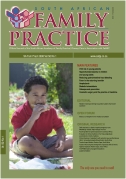Knowledge, attitudes and management of alcohol problems in general practice in rural South Africa
Keywords:
Knowledge, attitudes, management, alcohol problems, general practitioners, primary care, rural South Africa
Abstract
Background: There has been increasing emphasis on the role of primary health care in the prevention and management of alcohol-related harm. The aim of this study was to determine attitudes to and management of alcohol problems in general practice in rural South Africa. Methods: A total of 61 general practitioners (GPs) were interviewed with the aid of a structured questionnaire (response rate 50%) in two rural districts. Results: The results indicate that 51% of the GPs felt that alcohol is an important issue in general practice. GPs were able to discriminate accurately between cases of problem drinking and alcohol dependence. GPs who reported high levels of alcohol-related education and training were more prepared to counsel problem drinkers, expressed more therapeutic commitment in their role and reported more appropriate management of these patients than did GPs with lower levels of Continuing Medical Education (CME) experience. Alcohol problems are recognised as an important problem in general practice, and improved training could increase the identification and management of alcohol problems in primary care. GPs rated the most critical barriers to alcohol interventions as competency training, role endorsement, not being adequately reimbursed, health policy not supporting prevention and their own alcohol problem. Conclusion: Alcohol problems are recognised as an important problem in general practice, and improved training, adequate reimbursement and health policy support could increase the identification and management of alcohol problems in primary care.
Published
2008-01-17
Section
Original Research
By submitting manuscripts to SAFP, authors of original articles are assigning copyright to the South African Academy of Family Physicians. Copyright of review articles are assigned to the Publisher, Medpharm Publications (Pty) Ltd, unless otherwise specified. Authors may use their own work after publication without written permission, provided they acknowledge the original source. Individuals and academic institutions may freely copy and distribute articles published in SAFP for educational and research purposes without obtaining permission.

